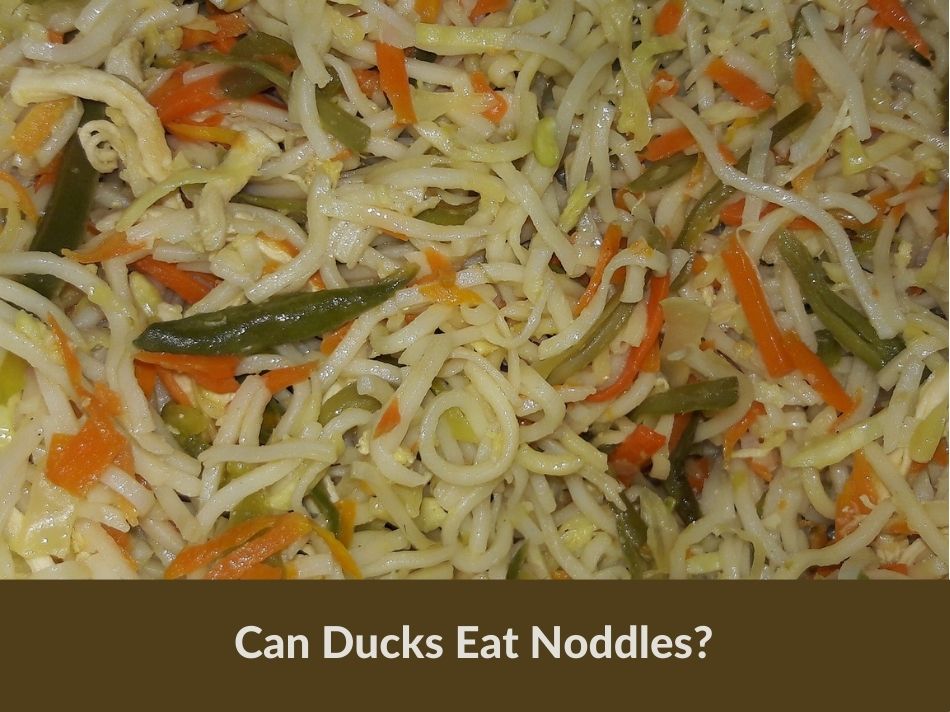Ducks, by nature, are omnivores, which means they eat a varied diet of both plants and small animals. In the wild, their diet mainly consists of aquatic plants, insects, small fish, and crustaceans. In domestic settings, ducks often eat specially formulated duck pellets, grains, vegetables, and fruits. But, can ducks eat noodles?
Yes, ducks can eat noodles, but there are some things to consider. Noodles, especially when they’re plain and cooked without any added salt, spices, or sauces, are relatively harmless for ducks. They are mostly carbohydrates, which can be digested by ducks.
In this article, readers will delve deep into the subject of feeding noodles to ducks. From understanding a duck’s natural diet to addressing concerns about feeding them noodles and the possible implications for ducklings, this comprehensive guide covers all facets of the topic.
How Often Can I Feed My Ducks Noodles?
If you decide to feed your ducks noodles, it should be done in moderation. Think of noodles as a treat rather than a regular meal. Once in a while, offering a small amount is acceptable, but it’s important not to make it a frequent event.
Can Ducklings Eat Noodles?
Ducklings are more sensitive compared to mature ducks. Their diet is crucial for their growth and overall health. While it’s not lethal for ducklings to consume noodles, it’s not recommended. They require a nutritionally balanced diet, rich in proteins and essential nutrients, to grow strong and healthy.
Are Noodles Healthy For Ducks?
Noodles, primarily made from flour and water, belong to the category of foods that are predominantly carbohydrates. When assessing the nutritional value of noodles for ducks, several factors come into play.
- Carbohydrates: The main component of noodles is carbohydrates, which can provide energy. While ducks can digest and extract energy from carbohydrates, their natural diet in the wild consists of more protein and fat sources. This means that while they can use the energy from noodles, they aren’t getting the full spectrum of nutrients they would typically seek out.
- Lack of Essential Nutrients: Noodles don’t offer the vital nutrients like vitamins, minerals, and specific fats that ducks need for optimal health. Ducks require nutrients such as niacin, calcium, and phosphorus in adequate amounts, none of which are present in significant quantities in noodles.
- Protein Deficiency: A duck’s natural diet is rich in protein sources like insects, small fish, and crustaceans. Noodles don’t provide the protein levels ducks need, especially during times of growth or molting.
- Sodium Concerns: If the noodles are prepared with salt or are from instant noodle packets, they can have high sodium content. Excessive sodium is not suitable for ducks and can lead to health issues, especially if consumed regularly.
- Absence of Fiber: Unlike grains and aquatic plants that ducks naturally consume, noodles lack the fiber that aids in digestion. This absence might not be detrimental in small amounts, but regular consumption could potentially disrupt their digestive processes.
- Additives and Preservatives: Commercially produced noodles, especially instant varieties, might contain additives, preservatives, and flavor enhancers. These components are not suitable for ducks and can be harmful if consumed in large quantities.
How To Feed Noodles To Ducks
- Choose Plain Noodles: Opt for plain noodles without any added salt, spices, or sauces. The simpler, the better, as added ingredients can be harmful to ducks.
- Cook Thoroughly: If the noodles are uncooked, boil them until they are soft. Hard, uncooked noodles can be challenging for ducks to digest.
- Cool Down: Before offering the noodles to the ducks, allow them to cool to room temperature to prevent any potential burns or discomfort.
- Break Into Smaller Pieces: While ducks are adept at swallowing food, it’s a good idea to break the noodles into smaller, more manageable pieces. This makes it easier for the ducks to consume and can reduce the risk of choking.
- Limit Quantities: Offer noodles in moderation. A handful per duck is more than enough. Remember, noodles should be an occasional treat, not a primary food source.
- Provide Fresh Water: Always have fresh water available when feeding ducks. It aids them in swallowing and digesting the food, and they might also enjoy playing in it!
More Foods Ducks Can Eat
While ducks thrive best on a diet resembling their natural intake, there are several human foods they can safely consume in moderation. From the varied spectrum of what humans eat, some items can serve as occasional treats for our feathered friends.
Here are some of the human foods that ducks can enjoy:
Make sure to see our list of human food ducks can enjoy.
Conclusion
In summary, while noodles can provide ducks with quick energy due to their carbohydrate content, they fall short in offering a balanced nutritional profile. If ducks were to rely heavily on noodles, they would miss out on essential nutrients, leading to potential health problems.
It’s always best to think of noodles as an occasional treat rather than a dietary staple for ducks.
Disclaimer: The information in this article is for informational purposes only. I'm not an expert or a veterinarian.


